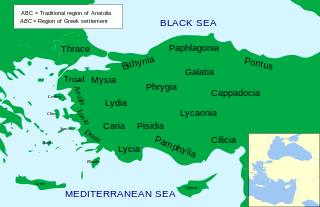Related Research Articles
The 200s decade ran from January 1, 200, to December 31, 209.
The 540s decade ran from January 1, 540, to December 31, 549.
The 150s decade ran from January 1, 150, to December 31, 159.
The 190s decade ran from January 1, 190, to December 31, 199.
Year 155 (CLV) was a common year starting on Tuesday of the Julian calendar. At the time, it was known as the Year of the Consulship of Severus and Rufinus. The denomination 155 for this year has been used since the early medieval period, when the Anno Domini calendar era became the prevalent method in Europe for naming years.

Year 549 (DXLIX) was a common year starting on Friday of the Julian calendar. The denomination 549 for this year has been used since the early medieval period, when the Anno Domini calendar era became the prevalent method in Europe for naming years.
Year 555 (DLV) was a common year starting on Friday of the Julian calendar. The denomination 555 for this year has been used since the early medieval period, when the Anno Domini calendar era became the prevalent method in Europe for naming years.
Year 235 (CCXXXV) was a common year starting on Thursday of the Julian calendar. At the time, it was known as the Year of the Consulship of Severus and Quintianus. The denomination 235 for this year has been used since the early medieval period, when the Anno Domini calendar era became the prevalent method in Europe for naming years.
The 220s decade ran from January 1, 220, to December 31, 229.
The 230s decade ran from January 1, 230, to December 31, 239.
The 240s decade ran from January 1, 240, to December 31, 249.
Year 232 (CCXXXII) was a leap year starting on Sunday of the Julian calendar. At the time, it was known as the Year of the Consulship of Lupus and Maximus. The denomination 232 for this year has been used since the early medieval period, when the Anno Domini calendar era became the prevalent method in Europe for naming years.

Year 278 (CCLXXVIII) was a common year starting on Tuesday of the Julian calendar. At the time, it was known as the Year of the Consulship of Probus and Lupus. The denomination 278 for this year has been used since the early medieval period, when the Anno Domini calendar era became the prevalent method in Europe for naming years.
Year 190 (CXC) was a common year starting on Thursday of the Julian calendar. At the time, it was known as the Year of the Consulship of Aurelius and Sura. The denomination 190 for this year has been used since the early medieval period, when the Anno Domini calendar era became the prevalent method in Europe for naming years.
Year 198 (CXCVIII) was a common year starting on Sunday of the Julian calendar. At the time, it was known as the Year of the Consulship of Sergius and Gallus. The denomination 198 for this year has been used since the early medieval period, when the Anno Domini calendar era became the prevalent method in Europe for naming years.

Year 208 (CCVIII) was a leap year starting on Friday of the Julian calendar. At the time, it was known as the Year of the Consulship of Aurelius and Geta. The denomination 208 for this year has been used since the early medieval period, when the Anno Domini calendar era became the prevalent method in Europe for naming years.
Year 223 (CCXXIII) was a common year starting on Wednesday of the Julian calendar. At the time, it was known as the Year of the Consulship of Maximus and Aelianus. The denomination 223 for this year has been used since the early medieval period, when the Anno Domini calendar era became the prevalent method in Europe for naming years.
The year 700 BC was a year of the pre-Julian Roman calendar. In the Roman Empire, it was known as year 54 Ab urbe condita. The denomination 700 BC for this year has been used since the early medieval period, when the Anno Domini calendar era became the prevalent method in Europe for naming years.
Cao Teng, courtesy name Jixing, was a eunuch who lived during the Eastern Han dynasty of China. He served four Han emperors. Through his adopted son Cao Song, he was the grandfather of Cao Cao, who laid the foundations for the state of Cao Wei in the Three Kingdoms period. On 3 August 229, during the reign of Cao Cao's grandson Cao Rui, Cao Teng was posthumously honoured as "Emperor Gao of Wei" (魏高帝), becoming the only eunuch in Chinese officialdom to have this honor.
References
- ↑ Daniélou, Alain (2003). A Brief History of India. Simon and Schuster. p. 116. ISBN 978-1-59477-794-3.
- ↑ A History of Chinese Letters and Epistolary Culture. BRILL. 2015. p. 137. ISBN 978-90-04-29212-3.
- ↑ Jones, Barry (2018). Dictionary of World Biography: Fifth edition. ANU Press. p. 349. ISBN 978-1-76046-219-2.
- ↑ Crespigny, Rafe de (2016). Fire over Luoyang: A History of the Later Han Dynasty 23-220 AD. BRILL. p. 269. ISBN 978-90-04-32520-3.
- ↑ Lee, Lily Xiao Hong; Stefanowska, A. D.; Wiles, Sue (2015). Biographical Dictionary of Chinese Women: Antiquity Through Sui, 1600 B.C.E. - 618 C.E. Routledge. p. 308. ISBN 978-1-317-47590-3.